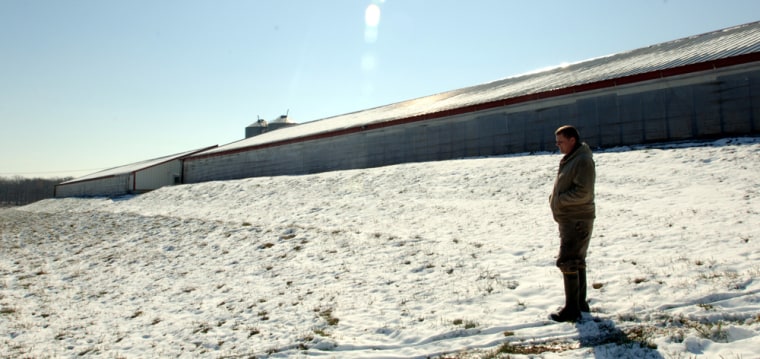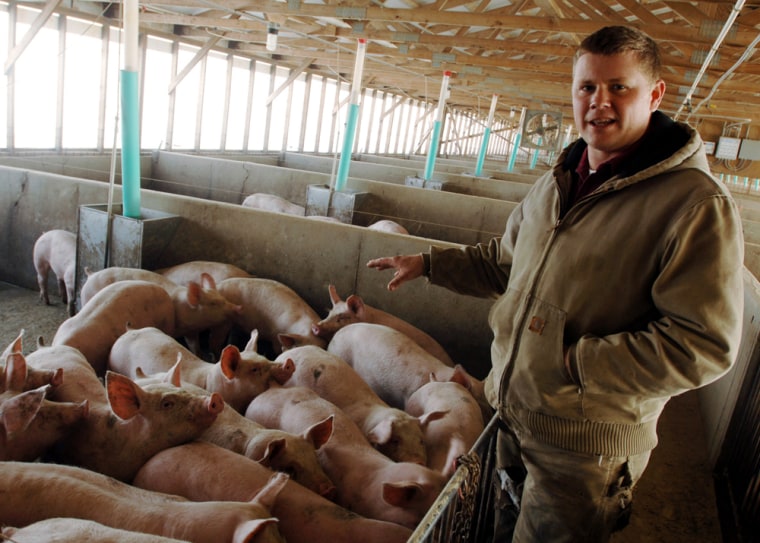Dick Lawler says he won’t surrender Mark Twain Lake, a recreation and drinking water resource for 21 communities in northeast Missouri, to a hog farm proposed nearby.
The real estate agent and resident is leading the fight to stop what he calls a “declared war on our lake” by corporate interests. He fears contamination, odor and loss of the community’s quality of life.
But if Lawler’s camp fears large-scale hog farms would spoil the air, water, aesthetics and property values, young farmer Jared Windmann sees corporate hog farming as salvation.
His family raises thousands of hogs under a contract with Minnesota-based Cargill Inc., an agreement that has allowed them to stay on the farm and build a business.
“Why do a contract?” Windmann asks. “Sheer risk. The rent is set for 10 years, even if the market is terrible.”
Northeast Missouri is one of the nation’s latest flashpoints over corporate hog farms as the agribusiness giant aggressively markets opportunities to farmers looking to hold on.
Cargill said it wants to sign up 30 farmers a year in northern Missouri, western Illinois and southern Iowa to raise company-owned hogs closer to Cargill processing plants in Ottumwa, Iowa, and Beardstown, Ill. Each slaughters 18,000 hogs a day.
The move is aimed at reducing Cargill’s fuel costs but also at gaining control of the hogs and end product, all to appease the tastes of the Asian market, a significant export niche.
Under the firm’s plans, contract farmers like Windmann do the raising, while Cargill owns the hogs, provides the feed and controls for antibiotic use — or not — and weight for market.
Smell, particulate regulations
What Cargill hadn’t counted on in its business plan was the resistance from northern Missouri.
More than a dozen Missouri counties have passed, and others are considering, health ordinances that control for odor and particulates, and require bonds, fees and annual inspections.

The rules, Cargill says, act as a deterrent to farmers and the banks that lend them money to build hog barns and waste systems — about $500,000 for a 2,500-head hog operation like Windmann’s.
“We’ve not seen anything like what we’ve seen here, this domino effect of counties establishing de facto moratoriums,” Cargill spokesman Mark Klein said. “These are moratoriums discriminating against one industry.”
Still, 15 to 20 Cargill contract hog farms could be built this summer in the targeted region, said Tim Steinkamp, who recruits hog producers for Cargill.
Despite the increase, industry officials see the public having more say.
In Marion County, plans for a 7,490-hog farm collapsed in December under the pressure of opposition from the village of Emerson, population 60, when the producer withdrew his permit application.
‘Odor is a four-letter word’
Dan Cassidy, the Missouri Farm Bureau’s chief administrative officer, said he worries that counties with health ordinances will suffer economically because investors will be scared away.
Proposed legislation in Missouri that would make it tougher for counties to restrict large livestock operations is on hold for a needed “cooling off” period, Cassidy said.
Marlin McCormick, who runs a grain elevator in Monroe City, said competing interests need to find common ground.
“Odor is a four-letter word in this part of the country, but what is going to be here for us to feast on for an economy? We don’t have the infrastructure for major industry.”
